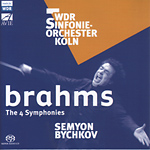The most prominent feature of Semyon Bychkov’s new live Brahms cycle is its overall light touch. The conductor’s predominantly swift tempos, combined with his careful phrasing gives the music an almost Mozartean feel. Bychkov seems to have scaled down his instrumental forces, as the Cologne orchestra sounds like a smaller band than it usually does. This has some positive effect on the Second Symphony, the bright disposition of which benefits from a less-weighty, more fluid approach, and Bychkov certainly captures the work’s sunny demeanor in the outer movements, while the Adagio flows with unusual urgency.
Symphony No. 1 is less accommodating to Bychkov’s style. The ensemble sound (balanced heavily toward woodwinds and strings) lacks the requisite heft–more precisely, there’s no bass, critical in Brahms. This problem plagues all four symphonies, most seriously in the Third, where the first movement sounds bodiless, and in No. 4’s andante, where Brahms’ grand restatement of his main theme doesn’t sing the way it should.
In the final analysis the music just doesn’t sound like Brahms, at least not the Brahms we know and appreciate from the Vienna Philharmonic or the Cleveland Orchestra (to name just two ensembles that have distinguished themselves in this music). Of course theirs is not the only way, but at least with those orchestras you don’t hear the Fourth Symphony’s scherzo and wonder if you’re listening to French light music. The somewhat murky recorded sound (even on SACD) compounds this release’s undesirability.
































